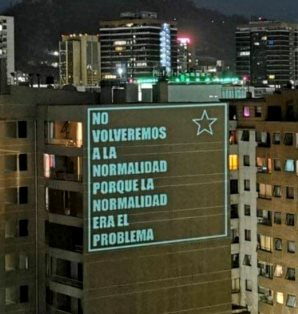
May Day is our day, even under lockdown
 The words projected onto a wall during the mass protests in Chile last year now resonate across the globe: 'We won't go back to normal, because normal was the problem'. The massive economic crisis accompanying the spread of COVID-19 illuminates that normalcy with a harsh spotlight.
The words projected onto a wall during the mass protests in Chile last year now resonate across the globe: 'We won't go back to normal, because normal was the problem'. The massive economic crisis accompanying the spread of COVID-19 illuminates that normalcy with a harsh spotlight.
The pandemic has exposed the incapacity of our health systems to cope with an emergency that was predictable and predicted. Health care, a basic human right, has been decimated by years of enforced austerity, outsourcing, 'just-in-time' management and profit imperatives. Now, in an emergency, health workers are bravely struggling with overwhelming shortages of personnel, protective equipment, essential supplies and medical facilities. Nursing homes have become mass tombs for the sick and the elderly.
The health crisis is symptomatic of a larger pathology. Food banks in wealthy countries are overwhelmed and millions of daily laborers walk the roads of India because permanent insecurity is a universal condition. Governments speak of overcoming fear in the fight against 'an invisible enemy', but 'normal' is rooted in fear: fear of losing one's job, fear of eviction, fear of becoming sick or injured, fear of falling into debt and poverty, the fear of reprisal for speaking up and organizing solidarity. May Day and the international labour movement were born in the struggle against the exploitation which underpins that fear.
Like the miners who, over the course of the last century, struck for soap along with better wages and improved mine safety, in the current crisis workers in hugely profitable meat and poultry companies have had to strike for elementary health and safety protection. Restaurant, food service and hospitality workers still working are fighting the same battle, as employers resist basic measures to mitigate the spread of the virus and save lives. IUF affiliates are struggling to secure soap, along with clean water, safe transport and housing and decent wages for agricultural workers.
Food and agricultural workers previously considered disposable are now deemed to be 'essential'. Will that recognition extend beyond the crisis to investment in health and public services, safe and secure work for all those who help feed the world, full protection for trade union rights and genuine steps towards a sustainable food system?
An ideological about-face has accompanied the crisis response. Balanced budgets, 'lean government' and austerity are forgotten (though notably not by all European Union finance ministers); governments are creating massive sums to stave off collapse, even putting money directly into people's pockets. Are we witnessing 'the end of neo-liberal capitalism', as the French bank Natixis recently proclaimed?
When the global financial machine collapsed in 2008, extraordinary measures were taken to revive it, and we were told that nothing could remain as before. Global finance was reanimated at public expense, after which we returned to 'normal'. Much of the world was still suffering from the impact of that failed response when COVID-19 appeared. 'Normal' lurches from crisis, and we face a global climate emergency.
Will governments discipline a bloated financial machine which is (again) receiving a generous share of bailout funds, with no democratic oversight? Will they turn to even greater reliance on 'public-private partnerships' when a return to normalcy is declared and it's back to business as usual, because 'there is no alternative'? Will they mobilize the resources needed to stave off environmental collapse? Will migrant workers now granted resident status as a crisis measure retain their permits when the pandemic abates, and will it be extended to future migrants? Will agricultural workers have to continue to fight for soap?
The answer depends in large measure on us. The status quo is not only untenable, declared Australia's United Workers Union at the onset of the crisis: 'Moments of rupture create space and impetus for change.' Social progress has never emerged spontaneously from collapse; we will have to organize that space. If public goods are to be brought under public control as we return to work, a vastly stronger labour movement and a more ambitious political agenda will be needed. And if we are indeed seeing the return of the state after being instructed for decades that 'the market' is the sole institution on which human society can be based, what kind of state will that be? Under cover of the crisis, many governments continue to pursue their ongoing assault on rights, and the crisis gives them new tools. Authoritarian government will emerge stronger from the pandemic if we don't organize to defend the democratic rights we need to breathe, organize and struggle together.
Since 1890, workers around the world have celebrated May Day on picket lines, at rallies, in prisons, in concentration camps and in the midst of insurrections; this year, for the first time in 130 years, we won't be on the streets. But May Day remains our day, the day on which labour affirms its global solidarity and commitment to fighting for a new world.
 Facebook
Facebook Google+
Google+ Reddit
Reddit Twitter
Twitter






